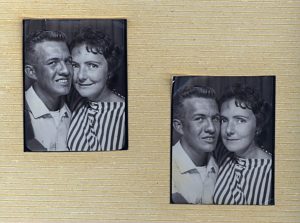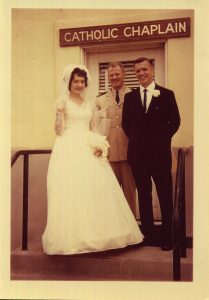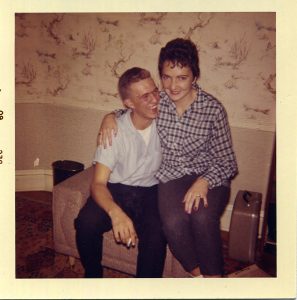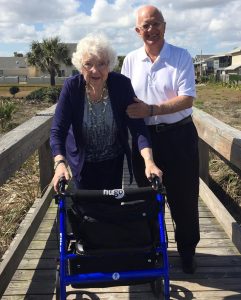Lead singer Patrick Miranda of the alternative rock band Movements is familiar with Alzheimer’s disease in more ways than one. As a child, he saw the disease in his own family. More recently, he has seen how the disease has impacted the family of his girlfriend.
We sat down to talk with Patrick about how his experiences and the lack of conversation about Alzheimer’s and dementia in the music community led him to write “Deadly Dull,” a song that tells the story of a couple – a wife who died of Alzheimer’s and her husband, still living with the disease.
This is the story of a man that I know A man with a heart of gold But a body becoming weak And a mind that let him go
This is the story of a man and his wife And how she died of that same disease How he stayed with her after her spirit left But he won’t remember her death and
It’s a deadly dull Like a sword stuck in its sheath A mind once sharp and full Now clouded and diseased
What’s it like to be erased every time you fall asleep? Waking up as a clean slate without a sense of reality? And will I end up the same way when I grow old and turn to grey? As time leaves me behind to fade away, away
Tell us more about your connection to Alzheimer’s disease and how the Movements song “Deadly Dull” relates to your experiences.
I was about eight years old when my grandmother passed from complications of Alzheimer’s disease. Although I don’t have a clear memory of everything that happened, I do remember going to see her at her nursing home. She would consistently ask my dad, “Where’s Ruben?” “I am right here, Mom,” he would say. Ruben is my dad’s name.
I don’t think the reality of the situation really hit me as hard as it would have if I had understood more about it at the time, or if I had been a bit older. I didn’t have another direct experience with the disease until I met my girlfriend’s grandparents a few years ago.
At that time, my girlfriend Alexis and I were in a long-distance relationship for about three months – she would come see me on tour, we would meet up where and when we could – and I was going to meet her family for the first time in Florida. The day I arrived, Alexis said, “I hate to do this, but there is somewhere we need to go.” Her beloved grandmother was on her deathbed.
Both Alexis’s grandmother and grandfather had Alzheimer’s, and when her grandmother passed, the whole family and I were there with her. It was really heavy. I had never experienced anything like that before; I never saw someone die in front of me.
It was even more heart-wrenching because Alexis’s grandfather didn’t know what was going on. He couldn’t understand why Alexis’s grandmother, his wife of more than 50 years, wouldn’t wake up. As soon as we left the hospice facility, he was asking about her again, because he had already forgotten everything that had happened that day. For months, he had to learn that his wife had died, over and over again, day after day. It was crushing.
Our song and video “Deadly Dull” is about that experience. That hit me really hard, and I wanted to talk about it in order to help myself and to raise awareness. Alzheimer’s isn’t really talked about much in the music scene, and I wanted to open up that conversation. 
Have you spoken to any of your fans about their own connections to Alzheimer’s, and the message of the song?
I have had more people come up to me who can relate to “Deadly Dull” than any song I’ve written in my life! It could be two or three people per show or sometimes lines of 20 to 30 people who want to talk about their connection to Alzheimer’s. It’s amazing and scary to see how so many people know what it’s like to go through the realities of this disease. The reaction that fans have has been so important to me. They thank me for writing about the disease, and they really appreciate that we are addressing the topic and being open about it.
I often have people tell me that one of my songs got them through a difficult time, but this song in particular is sticking with people. The truth is that this is one of the most important messages we’ve put into a song. Beyond the younger generation, which makes up much of our fan base, I’ve had parents who have brought their kids to our concerts and thank me for “Deadly Dull” because of their own experiences with the disease. The message of the song transcends the barriers of age, because, sadly, so many generations know what it’s like to have family member with dementia. I don’t think Movements has another song that quite does that.
What do you want fans that haven’t experienced Alzheimer’s directly to know about this disease?
A lot of people don’t understand the depth of the disease. I’ve encountered so many people who still seem to think that it’s a disease that just makes you forgetful – minor things like misplacing one’s keys. There are also people who seem to accept it for what it is and figure that there is no cure, so “Oh, well,” there is nothing we can do. Our band hopes that instead of turning away from the disease, people will raise funds towards research.
I want people to understand that Alzheimer’s is more than the misconceptions. My own hope is that we will one day find a cure or effective treatment. It’s very possible that any one of us can lose every sense of the person we are to this disease. We are all susceptible to becoming a shell of the person we used to be, all of our collective years of memories of love … gone. It’s a scary thought, but we can do something about it. 
Has this experience – writing and performing the song, making the video, heading out on tour – been cathartic for you?
This whole ride has been a healing process for me. When I write music dealing with heavy topics, which typically focus on my own anxiety and depression, writing a song helps let it go. I hate talking about my feelings, and I sometimes bottle everything up until I want to explode. Being able to put all of those negative or sad emotions into a song is a type of therapy for me. I have the power to help myself get through those rough times I am going through.
Growing up, sad music that focused on the heavier topics of life actually ended up making me happier than happy music. There is solidarity with artists who write this kind of music, and although not every story has a happy ending, my music helps me communicate with people who also have a hard time talking about these topics. There is nothing more therapeutic than knowing you are not alone.
When I look my at my life and all the amazing things I’ve been able to experience with my music and all the connections that I’ve made with people, it’s hard to think about a day when I may not be able to remember all of that. It really hurts. I want people to understand the complexities of Alzheimer’s disease and that anyone can join the fight just by educating themselves about the disease. Our band knows that it’s more important than ever to spread awareness in the community, any way we can. 
About: Movements embarks on their Feel Something tour in March and will be touring the U.S. and the U.K. through the month of May. Select shows will have materials available about The Longest Day, the Alzheimer’s Association summer solstice event that allows participants to select any activity they love — or an activity loved by those affected — to help end Alzheimer’s.